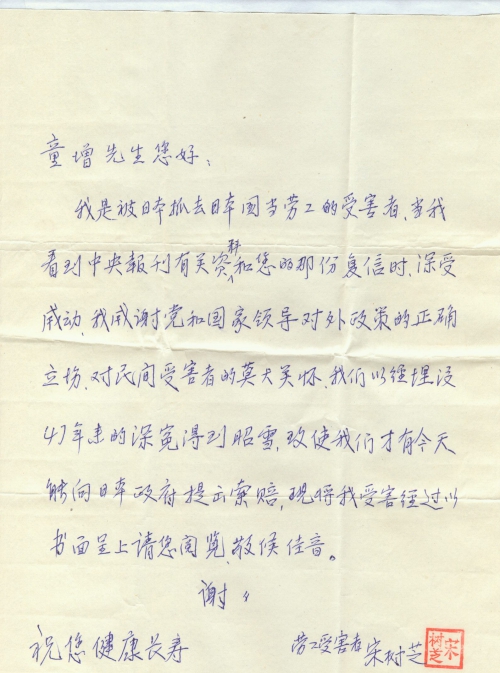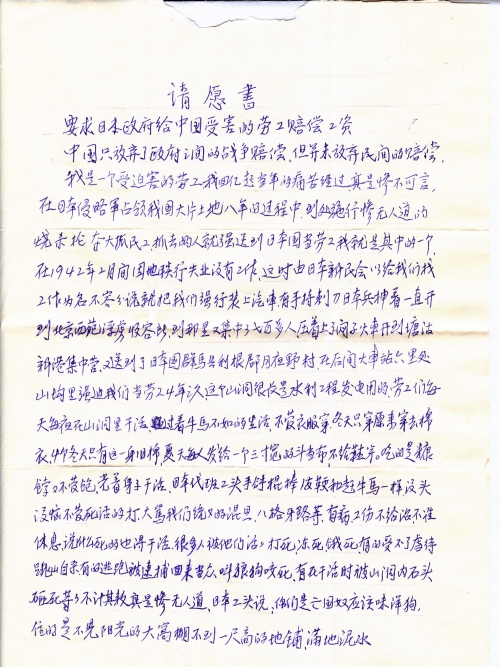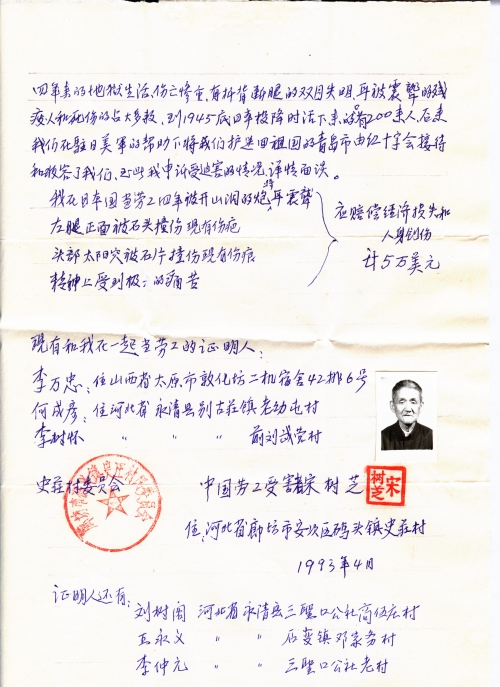Date of Letter:1993-04-25
Address of Author:Langfang City, Heibei Province
Date of Event:1942-03
Location of Event:Langfang City, Heibei Province
Name of Author:Song Shuzhi
Name(s) of victim(s):Song Shuzhi
Type of atrocity;Slave Laborers (SL)
Other Details:In March 1942, Song Shuzhi and other unemployed workers were forced to be sent to Beijing Camp by Japanese puppet New People Association. After over 700 people were gathered, they were sent to Tanggu Concentration Camp with their hands tied by ropes. Then, they were sent to Shiminoseki seaport, Japan and finally to a valley in Gunma. The slave laborers were forced to cut mountains and carried stones nonstop. They ate only two small bran dumplings as a meal, wore one cotton-padded suit for 3 winters and were bare to the waist when working in summer, like cattle and horses. Some were beaten, frozen, starved or bitten by dogs to death, or committed suicide, and many became disabled. When Japan surrendered in 1945, only 30% of the laborers survived and were sent back home in 1946.
Teacher Tong,
Hello!
I am a victim who was captured and sent to Japan for hard labor. I was extremely moved after reading relevant materials published on central newspapers and magazines and your reply. I am thankful to the party and national leaders for their righteous standpoint of foreign policies and great care towards civil victims. Now the extreme injustice that has been covered up for 47 years is exposed, we can finally claim reparations against Japan. I hereby submit the details in writing for your review. Looking forward to your good news.
Thank you!
I wish you good health and longevity
Hard labor victim: Song Shuzhi
April 25th, 1993
Petition
Demand that the Japanese government to pay compensation to victimized Chinese hard laborers
China has only given up the war reparations between governments, but has never given up claiming civil reparations.
I was a persecuted hard laborer. The memory of the misery I experienced is too painful for me to describe. During the eight years when the Japanese invaders occupied the enormous land of China, they ruthlessly burned, killed, and looted, and kidnapped large numbers of workers everywhere and sent them to Japan as hard laborers. I was one of them. In February, 1942, I lost my job in the carpet store that had gone out of business. Using finding jobs for us as an excuse, the Japanese Association of New Democracy forced us into cars and drove us all the way to Beijing Xiyuan Internment Camp, guarded by Japanese soldiers holding bayonets all along. After over 700 people were gathered, we were sent to Tanggu Xin’gang Concentration Camp by train and finally to Tsukiyono Village, Tone District, Gunma County, in Japan. They compelled us to work as hard laborers in a ravine 6 lis ( 1 li = 500 meters) from the train station (后间火车站) for four years. The cave was very long, which was used for hydroelectricity. The laborers worked in the cave every day and night, living a life worse than that of cattle and horse. The clothes we wore during four winters were the same old coats we wore when we first arrived there. In summer time, each of us was given a 3-inch-wide loincloth, with no shoes. We ate chaff buns that never quench hunger. We were working nakedly, while the Japanese foremen were wielding clubs and whips, herding us like cattle and horses. They beat us relentlessly without caring whether we were dead or alive, and called us bastards and assholes. The sick or injured laborers could not get medical treatment or rest. Many of us were beaten, frozen and starved to death; while some others could not stand the abuse and committed suicide by jumping from the cliffs; some were bitten to death by military canines in front of the crowd after they were captured from escape; some were stoned to death in caves when working. The number of death was countless. It was atrocious! The Japanese foreman said:” You are conquered people and deserved to be fed to foreign dogs.” We lived in shacks with no sunlight and slept on floors of less than 1 foot high, with muddy water everywhere. The four years’ hellish life took heavy tolls in injuries and death. Broken backs or legs, blinds, deaf, handicaps, and deaths are pervasive.At the end of 1945 when Japan surrendered, only around 200 people survived. Later, with the help of US forces stationed in Japan, we were escorted back to the city of Qingdao, where the Red Cross received and accommodated us. Here I accuse the Japanese for their persecution . We can talk in details when we meet.
During the four years in Japan, I was deafened by bombs used to explore the mountain
The front of my left leg was crushed by stones and the scar still exists
The temple of my head was hit by scrabbling rocks and the scar still exists
I suffer enormous pain mentally
So I should be compensated for 50,000 US dollars for economic losses and physical injuries. Witnesses who were laborers at that time are:
Li Wanzhong: lives in No. 6, Row 42, Second Machinery Dorm, Dunhuafang, Taiyuan City, Shanxi Province
He Chengyan: lives in Laoyoutun Village, Bieguzhuang Town, Yongqing County, Hebei Province
Li Shuhuai: lives in Qianliuwuying Village, Bieguzhuang Town, Yongqing County, Hebei Province
Shizhuang Village Committee (Village Committee Seal)
Chinese laborer victim: Song Shuzhi (name seal)
Lives in Shizhuang Village, Matou Town, Anci District, Langfang City, Hebei Province
April, 1993
Witnesses also include:
Liu Shuge Gaowuzhuang Village, Sanjiakou Commune, Yongqing County, Hebei Province
Wang Yongyi Dengjiawu Village, Houbian Town, Yongqing County, Hebei Province
Li Zhongyuan Lao Village, Sanshengkou Commune, Yongqing County, Hebei Province

















